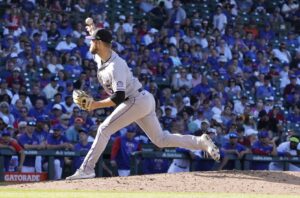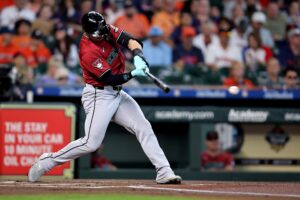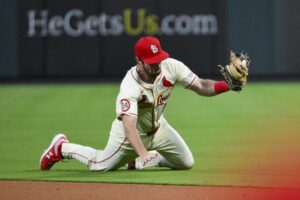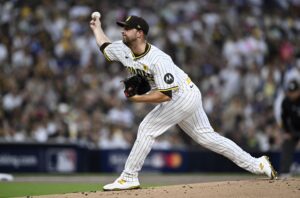The 2018 Hall of Fame Ballot has plenty of worthy contenders to join the Hall of Fame this upcoming year. 14 players return to the ballot, and 19 new players have been listed on the ballot. Today, we look at the career of pitcher Curt Schilling.
Known for his bloody sock moment in the 2004 ALCS, Curt Schilling also had a fastball that made opposing batters shake.
Making the Case: Curt Schilling and the 2018 Hall of Fame Ballot
Career Profile
Drafted by the Boston Red Sox with the 39th overall pick in the second round of the 1986 MLB January Draft-Regular Phase, Schilling would wait two years to play in MLB, but it would not be with the Red Sox. On July 28th, 1988, Schilling, along with center fielder Brady Anderson, was traded to the Baltimore Orioles. In exchange, the Red Sox acquired pitcher Mike Boddicker. After three years in Baltimore, Schilling, along with center fielder Steve Finley and pitcher Pete Harnisch, was traded to the Houston Astros on January 10th, 1991. In exchange, the Orioles acquired first baseman Glenn Davis. After a year in Houston, Schilling would be traded to the Philadelphia Phillies on April 2nd, 1992. In exchange, the Astros acquired pitcher Jason Grimsley. Schilling would end up re-signing with the Phillies following the season, and would play there for nine years.
Schilling would then be traded to the Arizona Diamondbacks in exchange for first baseman Travis Lee, and pitchers Vicente Padilla, Omar Daal, and Nelson Figueroa. After four years in Arizona, Schilling would be traded back to where he was drafted, the Red Sox. In exchange, the Diamondbacks acquired center fielder Mike Goss, pitchers Casey Fossum, Brandon Lyon, and Jorge De La Rosa. After his contract expired, Schilling signed a one year contract for $8 million. Schilling would formally announce his retirement from baseball on March 23rd, 2009.
Statistics and Accomplishments
In his time with the Phillies, Schilling pitched to a 3.35 ERA with 1,554 strikeouts in 1,659.1 innings pitched. During his time with Arizona, Schilling pitched to a 3.14 ERA with 875 strikeouts in 781.2 innings pitched. With Boston, Schilling pitched to a 3.95 ERA with 574 strikeouts in 675 innings pitched. With Baltimore, Schilling pitched to a 4.54 ERA with 42 strikeouts in 69.1 innings pitched.
In his total career, Schilling pitched to a 3.46 ERA with 3,116 strikeouts in 3,261 innings pitched. Schilling would win three World Series titles, one with the Diamondbacks in 2001, and two with the Red Sox in 2004 and 2007. In the championship run with the Diamondbacks, Schilling would win the World Series MVP. He would also win the NLCS MVP award with the Phillies in 1993. Schilling was also named an All-Star six times during his career. Three of them would be consecutive during Schilling’s tenure with the Phillies from 1997-1999. He was also named an All-Star with the Diamondbacks in 2001 and 2002. His last All-Star nod came in 2004 while with the Red Sox.
The Arguments For and Against
Schilling has an incredible case with three World Series championships, not to mention a World Series MVP, and NLCS MVP to boot. Even though the case for him is strong, some have argued in the past that some of his starts were rather soft, and he had help from his bullpen.
Final Verdict
With Schilling failing to get into the Hall of Fame since 2013, this year is finally his time. The three World Series championships and the incredible strikeout numbers in his career makes it puzzling how Schilling hasn’t gotten into the Hall yet. Even with a talented class, Curt Schilling will finally get the nod he deserves into Cooperstown.
Main Photo:
Embed from Getty Images






